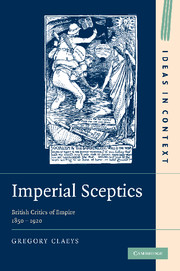3 - Contextualising Hobson:
civilisation, utility and socialist imperialism
Published online by Cambridge University Press: 06 December 2010
Summary
We saw at the outset of this book that J. A. Hobson's Imperialism (1902) is often taken as the starting-point of anti-imperialist thought in Britain. Let us recall A. J. P. Taylor's claim that Hobson's
discovery was an off-shoot from his general doctrine of under-consumption. The capitalists cannot spend their share of the national production. Saving makes their predicament worse. They demand openings for investment outside their saturated national market; and they find these openings in the undeveloped parts of the world. This is Imperialism … Yet the earlier Radical opponents of Imperialism knew nothing of it. They supposed that Imperialism sprang from a primitive greed for territory or a lust for conquest.
So, too, Wolfgang Mommsen, who wrote that Hobson ‘deserves credit for being the first to point out the link between imperialism and social structure on the one hand and economic factors on the other’. Most accounts of Imperialism share similar assumptions, and shed little or no light on criticisms of empire beforehand, or do so chiefly in reference to Marx. Some see Hobson as explaining events only from the mid-1890s onwards (and possibly indebted to other authors), and thus marking a new phase in the development of finance capitalism rather than a more aggressive stage of colonial expansionism originating earlier. Nor, as we saw in chapter 2, do analyses of socialist anti-imperialism which take Hobson as their point of departure say much about his predecessors.
- Type
- Chapter
- Information
- Imperial ScepticsBritish Critics of Empire, 1850–1920, pp. 235 - 281Publisher: Cambridge University PressPrint publication year: 2010

